Your AI Marketing Looks Like Everyone Else's
Your AI Marketing Looks Like Everyone Else's: The Strategic Differentiation Problem
Strategic Analysis by: Insight2Strategy
Published: September 22, 2025
Executive Reading Time: 8 minutes
Executive Strategic Insights
- 85% of marketers use AI for content creation, yet marketing messages are becoming increasingly homogeneous across industries
- Three critical implementation mistakes are driving the AI convergence crisis: template dependency, optimization without strategy, and reactive adoption
- Strategic AI differentiation requires a four-phase framework: foundation development, custom training, proprietary data integration, and human-AI collaboration
- Companies building sustainable competitive advantages treat AI as a strategic amplifier rather than a tactical replacement
- Success metrics must extend beyond engagement rates to include brand consistency and competitive differentiation measures
- The organizations winning this transition are developing AI implementations that reinforce rather than erode their unique market positioning
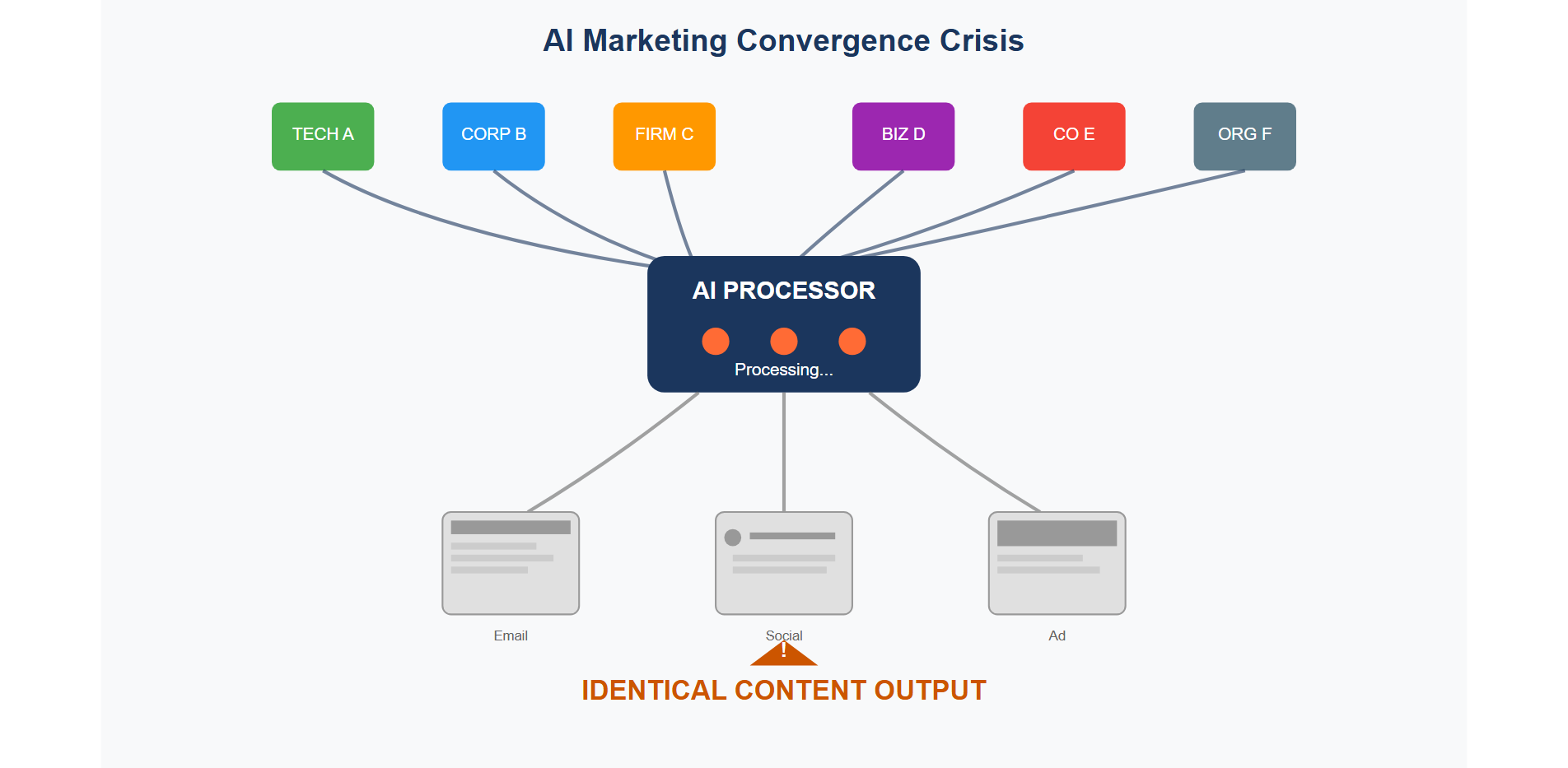
The Great AI Marketing Convergence Crisis
Walk into any marketing conference today and you'll witness something unprecedented: hundreds of companies proudly showcasing AI-powered campaigns that look virtually identical. The same optimization patterns, the same "personalized" messaging structures, the same conversion-focused language frameworks. What was supposed to be marketing's great differentiator has become its great equalizer.
Recent research reveals a striking paradox: 85% of marketers believe AI will significantly impact content creation, yet industry analysis shows marketing messages across brands and industries are becoming increasingly similar and predictable. This isn't coincidence—it's the inevitable result of what we call the "AI convergence crisis."
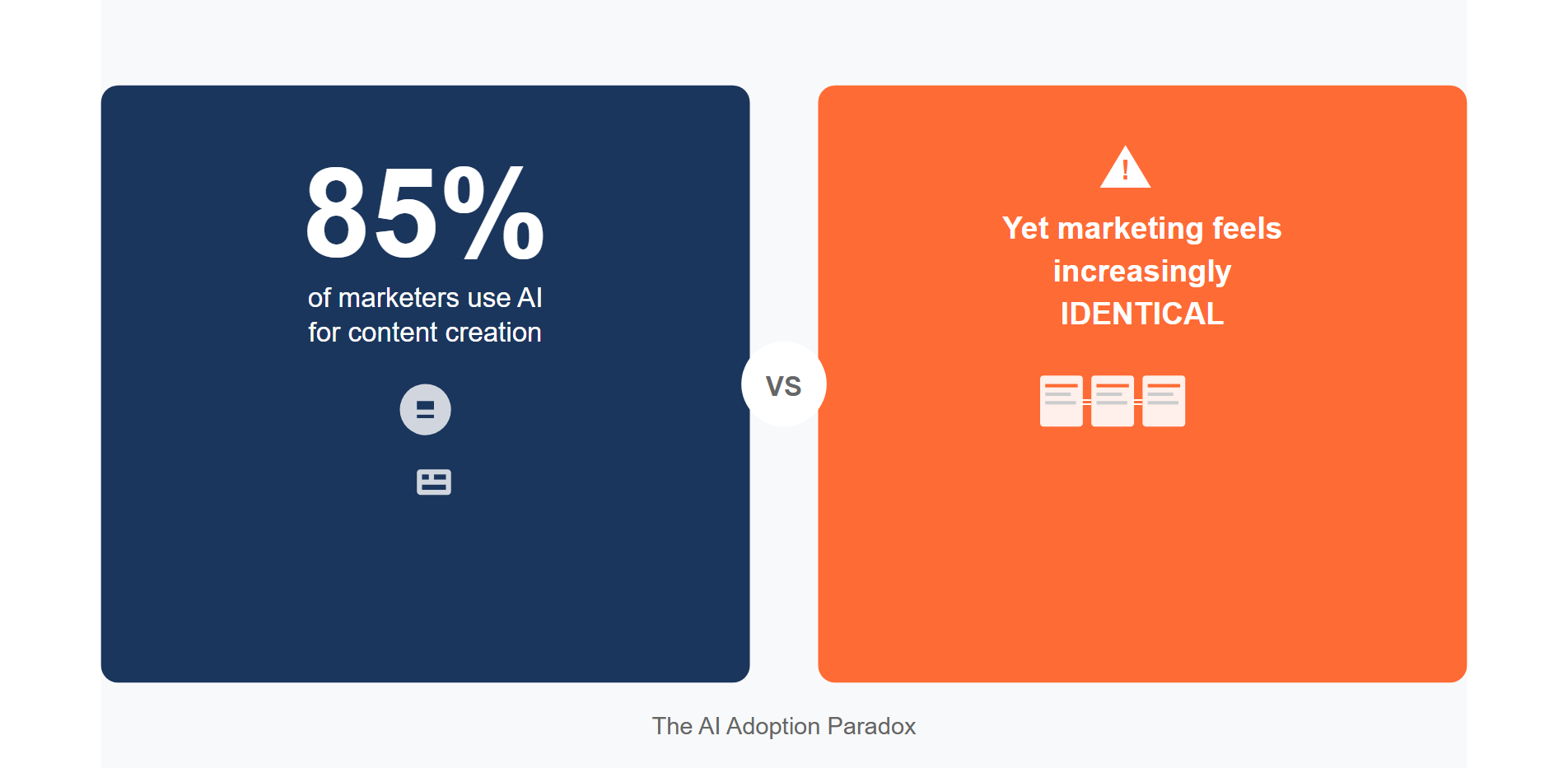
For emerging tech companies struggling to break through crowded markets, this convergence presents both an existential threat and an unprecedented opportunity. While your competitors settle for statistically optimized sameness, you can leverage strategic AI implementation to create genuine differentiation that builds lasting competitive advantages.
Why Does AI Marketing Create Commodity Content?
The root problem isn't artificial intelligence itself—it's how most organizations implement it. Three fundamental mistakes are driving this homogenization crisis:
The Template Trap
Most businesses approach AI like a sophisticated autocomplete tool, feeding generic prompts into advanced systems and expecting unique outputs. When you ask ChatGPT to "write compelling marketing copy" or instruct Claude to "create engaging email content" without providing strategic context, brand voice parameters, or competitive positioning guidelines, the AI responds with statistically optimal content that mirrors everyone else's approach.
These systems are trained on millions of existing marketing messages, naturally gravitating toward language patterns that represent the mathematical average of "successful" content. The result? Copy that performs adequately but lacks distinctive brand personality or strategic differentiation.
Optimization Without Strategic Framework
Companies obsess over engagement metrics, click-through rates, and conversion optimization while ignoring the strategic layer that creates long-term competitive advantage. AI-generated content often excels at tactical performance—higher open rates, better algorithmic reach, improved A/B test results—while systematically eroding the brand equity and unique positioning that drives sustainable business growth.
This tactical focus creates a dangerous feedback loop: successful metrics reinforce generic approaches, gradually training both AI systems and marketing teams to prioritize short-term performance over strategic differentiation.
The Reactive Implementation Pattern
Most organizations adopt AI tools reactively, implementing whatever their competitors use rather than developing strategic frameworks aligned with their unique value proposition. They focus on efficiency gains and cost reduction without considering how AI implementation affects their competitive positioning or brand differentiation.
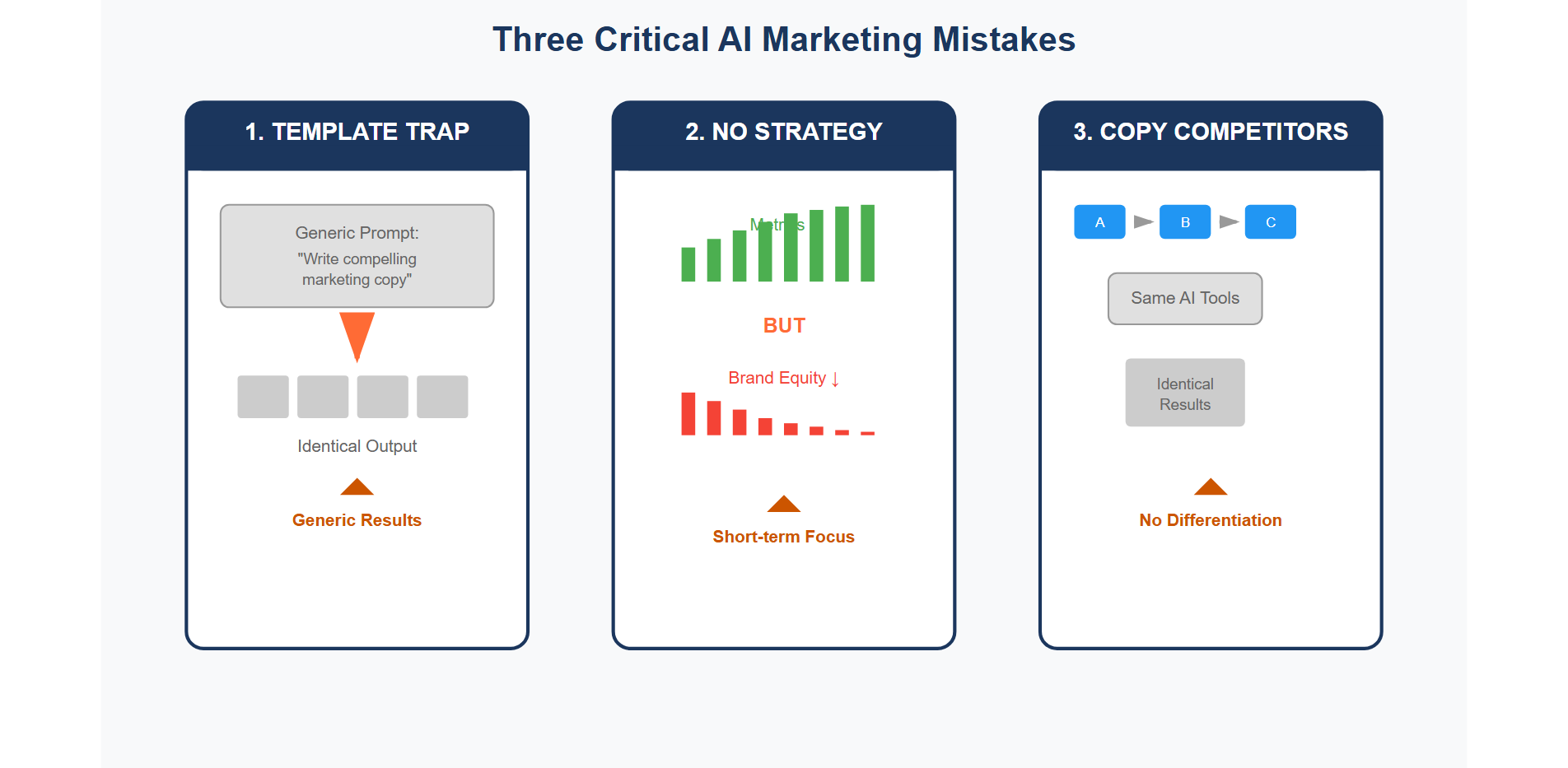
What Are the Hidden Costs of Generic AI Marketing?
When your AI-generated content blends into the competitive landscape, you're not just missing opportunities—you're actively undermining your business foundation:
Brand Voice Dilution
Your brand voice represents your company's unique personality and value system. Research consistently shows that consistent brand presentation can increase revenue by 23%. When AI systems default to statistically optimal language patterns, they systematically erode the distinctive communication style that builds recognition, trust, and emotional connection with your audience.
Audience Disengagement
Today's consumers have developed sophisticated filters for generic content. They might not consciously identify AI-generated copy, but they instinctively recognize and dismiss formulaic messaging. Studies show that perceived authenticity directly correlates with engagement rates, purchase intent, and brand advocacy—all of which suffer when your content feels algorithmically optimized rather than strategically crafted.
Strategic Commoditization
The most significant cost is strategic stagnation. By focusing solely on operational efficiency, organizations miss AI's potential for scaling intelligence, analyzing proprietary data, and creating content that reflects unique market insights and competitive positioning.
How Do You Build Strategic AI Differentiation?
Breaking free from the AI convergence crisis requires treating artificial intelligence as a strategic amplifier rather than a tactical replacement. This demands a systematic approach that puts differentiation first and optimization second:
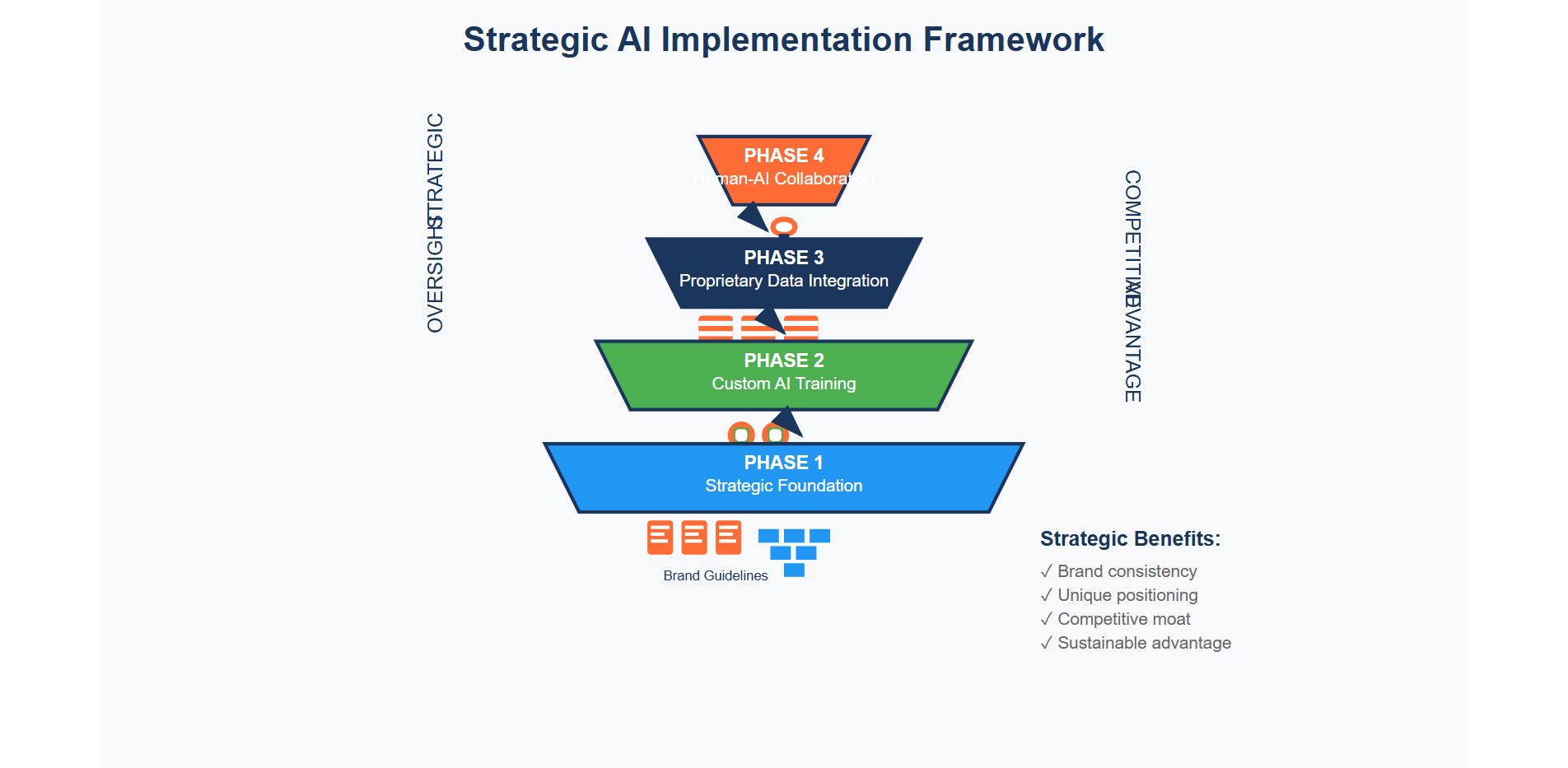
Phase 1: Strategic Foundation Development
Before implementing any AI tools, establish comprehensive brand voice documentation, competitive positioning frameworks, and unique value proposition guidelines. This strategic foundation becomes the lens through which all AI-generated content gets filtered and refined.
Create detailed brand voice specifications that go beyond vague descriptions like "friendly and professional." Define your communication DNA with specific parameters: core messaging pillars, tone spectrum guidelines, preferred lexicon and avoided terminology, rhythm and cadence preferences, and formatting conventions that reflect your brand personality.
Phase 2: Custom AI Training and Implementation
Develop brand-specific prompt libraries that function as "strategic DNA" for your AI systems. Instead of generic requests, create sophisticated, multi-layered prompts that include role definition, audience specification, brand voice integration, strategic objectives, and competitive positioning context.
Strategic Prompt Example
Rather than asking AI to "write a blog post about AI marketing," construct prompts like: "Acting as Insight2Strategy's chief marketing strategist, create a 1,400-word thought leadership article targeting emerging tech company founders who are struggling with market differentiation. Integrate our brand voice guidelines emphasizing strategic depth and practical insights. The goal is to position our strategic AI consultation services as essential for competitive advantage while avoiding generic optimization jargon."
Phase 3: Proprietary Data Integration
This is where true differentiation happens. Generic AI draws from public datasets, but strategic AI leverages your unique intelligence. Feed your systems proprietary market research, customer interview insights, competitive analysis findings, and performance data from your most successful campaigns.
When you ask AI to incorporate "key customer frustrations from our Q3 feedback analysis" or "competitive positioning insights from our market research," you elevate output from generic content to genuine thought leadership that could only come from your organization.
Phase 4: Human-AI Collaboration Framework
The most successful implementations combine AI efficiency with human strategic oversight. Shift your team's role from content creators to strategic directors, quality controllers, and brand guardians. Human expertise adds nuance, emotional intelligence, and strategic refinement that ensures final outputs perfectly align with your competitive positioning and brand objectives.
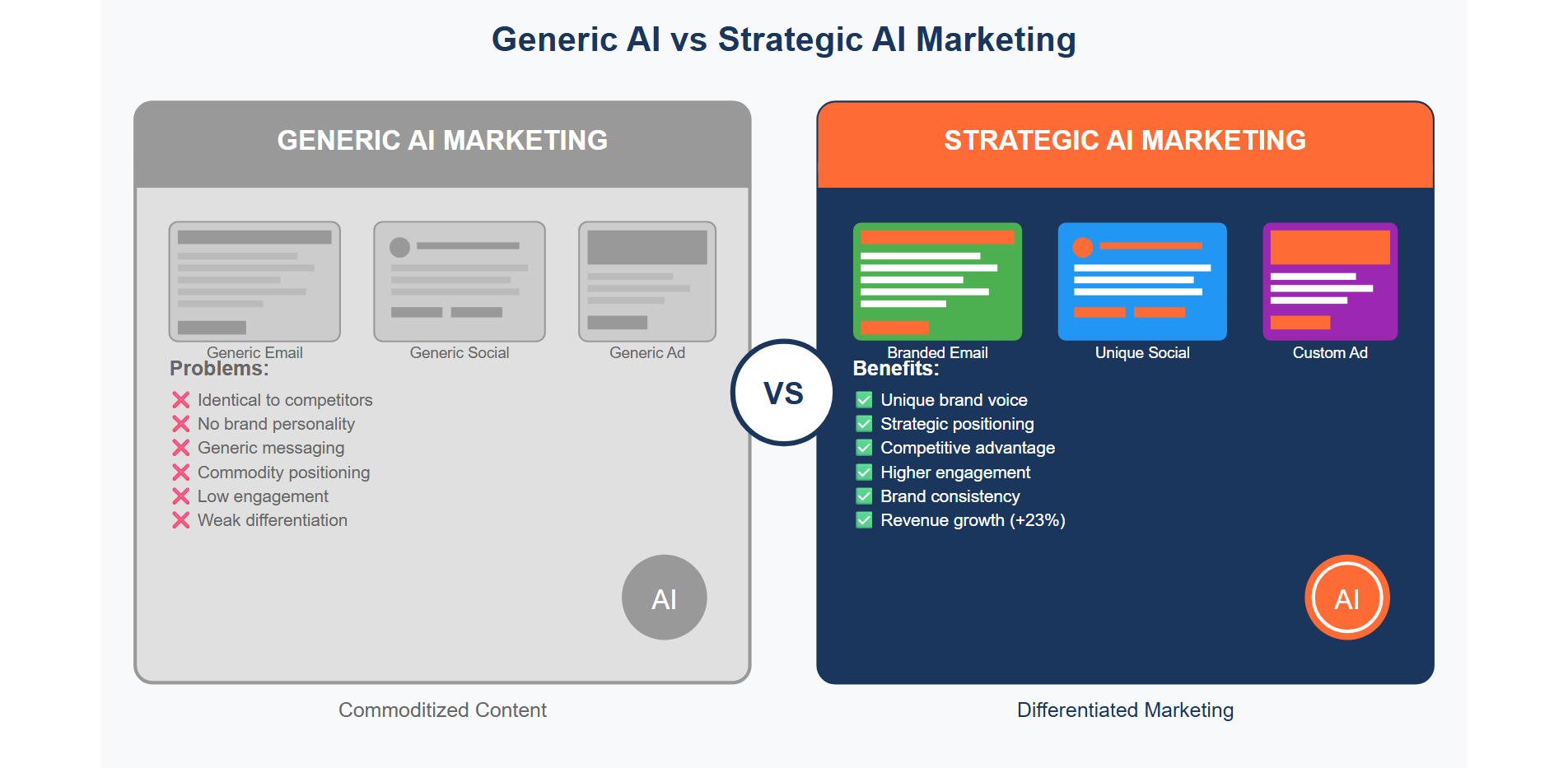
What Makes AI Implementation Strategically Successful?
The companies winning in this new landscape aren't just using AI tools—they're building AI strategies that reinforce their unique competitive position. This requires systematic thinking about how artificial intelligence can amplify rather than replace your strategic advantages.
Start by auditing your current AI implementation against strategic criteria: Does your AI-generated content sound distinctively like your brand? Does it reinforce your unique market position? Does it incorporate proprietary insights that competitors can't replicate?
If the answer is no, you're not behind on technology—you're behind on strategy.
Transform Your AI Marketing Strategy
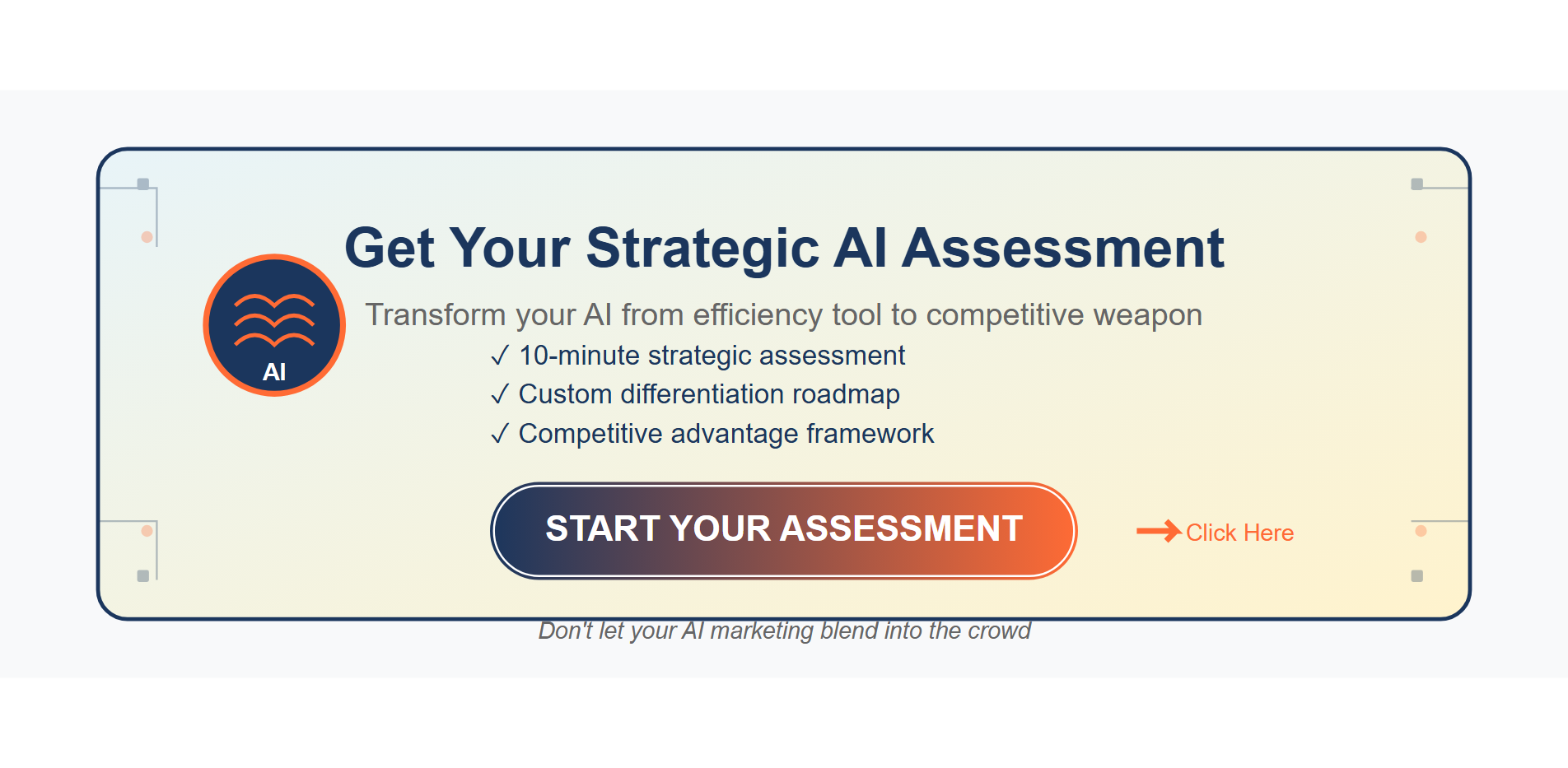
Ready to break free from the AI convergence crisis and build marketing that truly differentiates your business? Our comprehensive Strategic AI Marketing Assessment provides the roadmap you need.
This detailed evaluation examines your current AI implementation, identifies differentiation opportunities, and delivers a customized strategy for leveraging artificial intelligence as a competitive advantage rather than a commodity tool.
Don't let your AI marketing look like everyone else's. In 10 minutes, discover how to transform your AI implementation from an efficiency tool into a strategic weapon that builds lasting competitive advantages.
Need personalized guidance? Our strategic AI marketing consultations help emerging tech companies develop customized frameworks for differentiated AI implementation.
Strategic AI Marketing Questions Answered
How do we measure AI marketing success beyond traditional engagement metrics?
Strategic AI implementation requires new measurement frameworks that balance performance optimization with differentiation preservation. Track brand consistency scoring across AI-generated content, competitive differentiation analysis comparing your messaging to competitor approaches, strategic alignment assessment evaluating how effectively AI content supports your unique value proposition, and long-term brand equity metrics including recognition, perceived differentiation, and premium pricing sustainability.
What's the biggest risk of generic AI marketing implementation?
The most significant risk is strategic commoditization—when your marketing becomes indistinguishable from competitors', you lose the unique positioning that commands premium pricing and customer loyalty. This erosion happens gradually as AI systems optimize for statistical averages rather than strategic differentiation, ultimately undermining the brand equity that drives sustainable business growth.
How long does strategic AI implementation typically take?
Strategic AI transformation follows a four-phase approach: Strategic Foundation Development (2-4 weeks), Custom AI Training Implementation (3-6 weeks), Proprietary Data Integration (4-8 weeks), and Human-AI Collaboration Framework deployment (ongoing optimization). Most organizations see initial differentiation results within 8-12 weeks, with full strategic alignment achieved over 4-6 months.
What makes some companies more successful at AI differentiation than others?
Companies achieving sustainable AI differentiation share three characteristics: they treat AI as a strategic amplifier rather than operational replacement, they invest in proprietary data integration that competitors cannot replicate, and they maintain human strategic oversight that ensures AI outputs align with competitive positioning rather than generic optimization patterns.
How do we balance AI efficiency with brand consistency?
Successful organizations implement hybrid frameworks combining AI operational efficiency with human strategic oversight. This involves developing brand-specific prompt libraries, creating systematic content review processes that evaluate both performance metrics and brand alignment, and establishing clear escalation protocols when AI outputs deviate from strategic positioning requirements.
About Insight2Strategy
Insight2Strategy helps emerging technology companies build strategic competitive advantages through differentiated AI marketing implementation. Our comprehensive assessments and strategic consulting services enable organizations to leverage artificial intelligence while preserving the unique brand positioning that drives sustainable business growth.
Ready to transform your AI marketing strategy? Schedule your free strategic consultation to discover how our proven frameworks can help your organization achieve genuine competitive differentiation in an increasingly homogeneous digital landscape.



Comments
Post a Comment